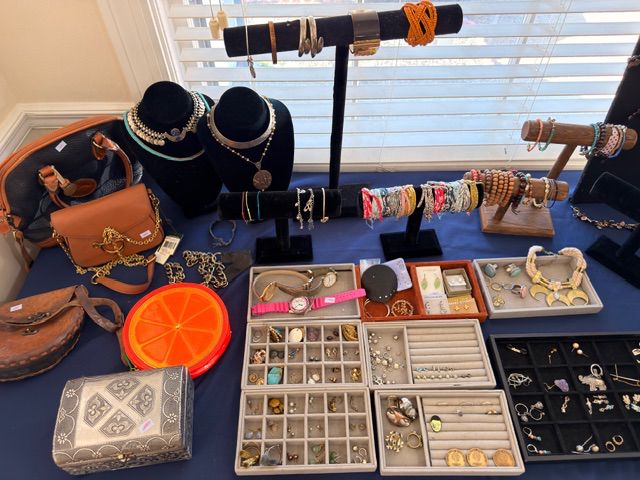If you want to score the best deals, it’s important to know how to negotiate prices at an estate sale. Estate sales can be a great way to score some amazing deals on a wide range of items, from antique furniture to vintage clothing and collectibles. But if you want to make sure you’re getting the best price possible, it’s important to know how to negotiate effectively. Here are a few tips to help you get the most out of your estate sale shopping experience.
Know the value of the item you’re interested in
Knowing the value of the item you’re interested in is a crucial step in the negotiating process. It’s important to have a good understanding of what the item is worth so you can make informed decisions about how much you’re willing to pay for it.
There are several ways to determine the value of an item. One option is to look up similar items online and see what they’re selling for. This can give you a good sense of the market value and help you decide how much you’re willing to pay. You can also check out price guides or consult with an expert if you’re not sure. Price guides are typically available for specific types of items, such as antiques or collectibles, and can give you a good idea of what the item is worth. Consulting with an expert can also be helpful if you’re not sure about the value of the item. Experts, such as appraisers or collectors, can give you a more accurate assessment of the value based on their knowledge and experience.
Having a baseline value for the item you’re interested in will give you a good starting point as you begin negotiating. It will also help you feel more confident in your negotiations and ensure that you’re not overpaying for the item. So before you start negotiating, be sure to take the time to research and determine the value of the item. This will help you get the best deal possible.
Don’t be afraid to haggle
Haggling or negotiating is a common and expected practice at estate sales. It’s completely normal to try to get the best deal possible, and the seller is likely expecting it. In fact, they may even be open to negotiating in order to move the item quickly.
Don’t be shy about negotiating at an estate sale. It’s important to remember that the seller is likely looking to get as much money as possible, but they also want to sell the item. It’s up to you to find a price that works for both of you. Be willing to negotiate and try to come to an agreement that works for both parties.
If you’re not comfortable negotiating, that’s okay too. Some people simply don’t enjoy the process, and that’s okay. However, it’s worth considering that by being willing to negotiate, you may be able to get a better deal on the item you’re interested in. So if you’re up for it, don’t be afraid to haggle a bit and see if you can get a better price.
Here are a few tips for negotiating on the spot at an estate sale:
- Be prepared to make an offer: Have an idea of how much you’re willing to pay for the item before you start negotiating. This will give you a baseline to work with and help you feel more confident in your negotiations.
- Be respectful and friendly: Even if you’re negotiating aggressively, it’s important to be respectful and friendly with the seller. Estate sales can be emotional events, and the seller may be attached to the items they’re selling. By being kind and understanding, you’re more likely to have a successful negotiation.
- Be willing to compromise: Negotiating is all about finding a price that works for both parties. Be willing to compromise and find a price that’s fair for both you and the seller.
- Be willing to walk away: If you’re unable to come to an agreement on a price, don’t be afraid to walk away. There are plenty of other estate sales out there, and it’s better to hold out for a good deal than to overpay for something.
By following these tips, you’ll be better equipped to negotiate effectively on the spot at an estate sale and get the best deal possible. In the end, the most important thing is to be respectful and friendly during the negotiating process. Estate sales can be emotional events, and the seller may be attached to the items they’re selling. By being kind and understanding, you’re more likely to have a successful negotiation and get a good deal. So, don’t be afraid to haggle and try to find a price that works for both of you.
Start with a lower offer
A common negotiation strategy is to begin with a lower offer, which can be especially useful at an estate sale. By starting with a lower offer, you have the opportunity to increase your offer if needed, especially if the seller is unwilling to lower their price significantly. This can be a helpful tactic in getting the best deal possible.
Starting with a lower offer also sends a message to the seller that you’re serious about getting a good deal. It shows that you’re willing to negotiate and that you’re not just going to accept their initial asking price without trying to get a better deal. This can be especially effective if the seller is motivated to move the item quickly and is willing to come down in price in order to make a sale.
Of course, it’s important to keep in mind that starting with a lower offer doesn’t mean you should lowball the seller. You should still be respectful and reasonable in your negotiating approach, and be prepared to come up in price if necessary. But starting with a lower offer can give you a good starting point for negotiations and help you get the best deal possible.
Be willing to walk away.
Negotiating can be a challenging process, and sometimes it’s just not possible to come to an agreement on a price. In these cases, it’s important to be willing to walk away.
Walking away from a negotiation can be difficult, especially if you really want the item you’re interested in. But it’s important to remember that there are plenty of other estate sales out there, and it’s better to hold out for a good deal than to overpay for something. By walking away, you’re showing the seller that you’re not willing to pay more than you think the item is worth, and you’re also setting a boundary for yourself and not letting emotions cloud your judgment.
Of course, this doesn’t mean that you should be inflexible in your negotiations. It’s important to be open to compromise and to find a price that works for both parties. But if you’re unable to come to an agreement, it’s okay to walk away. You can always keep an eye out for other estate sales or look for similar items elsewhere.
In the end, it’s important to be willing to walk away if necessary in order to get the best deal possible. Don’t be afraid to hold out for a good deal and to set boundaries for yourself. By being willing to walk away, you’ll be better equipped to negotiate effectively and get the best price possible.
Consider making a trade
One way to potentially get a better deal at an estate sale is to consider making a trade. If you have something the seller might be interested in, you can try offering to trade it for the item you’re interested in. This can be a great way to get a good deal and also declutter your own home.
For example, if you have a piece of furniture that you no longer have room for, but you’re interested in a vintage lamp at an estate sale, you could try offering to trade the furniture for the lamp. The seller may be open to this if they’re looking to declutter their own home or if they have a particular interest in the item you’re offering.
Trading can be a great way to get a good deal and also get rid of items you no longer need or want. It’s also a more sustainable option than buying new, as you’re reusing and repurposing items rather than contributing to the demand for new products.
Of course, it’s important to be realistic about what you have to offer. You may not be able to trade something you consider to be of little value for something that’s worth a lot, but it’s worth considering if you think the seller might be interested. Just be sure to be respectful and honest in your negotiations, and be open to compromising if necessary.
Be respectful and friendly
While it’s important to be assertive and try to get the best deal possible, it’s also important to be respectful and friendly during the negotiating process. Estate sales can be emotional events, and the seller may be attached to the items they’re selling. By being kind and understanding, you’re more likely to have a successful negotiation and get a good deal.
Here are a few tips for being respectful and friendly while negotiating at an estate sale:
- Be polite and use please and thank you
- Show interest in the seller and the items they’re selling
- Avoid being rude or confrontational
- Be understanding if the seller is attached to the item and unwilling to come down in price
- By following these tips, you’ll be more likely to have a positive negotiating experience and get a good deal. Remember, it’s okay to be assertive and try to get the best price possible, but it’s also important to be respectful and considerate of the seller’s feelings. By maintaining a friendly and respectful demeanor, you’ll be more likely to get a good deal and have a positive experience at the estate sale.
Keep an eye out for discounts
If you’re shopping at an estate sale, it’s worth keeping an eye out for discounts that may be available. Many estate sales offer discounts on certain items or for certain customers, and these discounts can be a great way to save money. Here are a few examples of discounts you might be able to take advantage of:
- Multiple item discounts: Some estate sales offer discounts for customers who purchase multiple items. This can be a great way to save money if you’re planning on buying more than one thing.
- Repeat customer discounts: If you’re a repeat customer at an estate sale, you may be able to get a better deal on items. Some sellers offer discounts to customers who have shopped with them before as a way of thanking them for their business.
- Early bird discounts: Some estate sales offer discounts to customers who arrive early, before the sale has officially started. This can be a great way to get a good deal on items that are likely to sell quickly.
- Special event discounts: Some estate sales offer discounts to customers who attend special events, such as a preview sale or a VIP event. These discounts can vary, but they’re often a good way to save money on items that are in high demand.
- By keeping an eye out for these discounts and asking about them if you’re interested, you may be able to save money on your purchases at an estate sale. It’s always worth asking about discounts if you’re interested, as you never know what might be available.
Be prepared to pay in cash
If you’re shopping at an estate sale, it’s a good idea to be prepared to pay in cash. Many estate sale sellers prefer to be paid in cash, and it can also make it easier to negotiate. Here are a few reasons why it’s a good idea to be prepared to pay in cash:
- Sellers may prefer cash: Many estate sale sellers prefer to be paid in cash because it’s a quick and easy way to complete the sale. It’s also easier for the seller to track their sales if they’re being paid in cash rather than by check or credit card.
- Negotiating may be easier: The seller may be more willing to come down in price if you’re paying with cash rather than a check or credit card. This is because cash is a more immediate form of payment, and the seller knows they’ll be able to complete the sale right then and there.
Of course, it’s important to be safe when carrying large amounts of cash. Make sure to keep it well-hidden and secure, and consider using a money belt or other secure storage option.
Overall, it’s a good idea to be prepared to pay in cash when shopping at an estate sale. This can make it easier to negotiate and complete the sale, and it’s also a more secure form of payment. So be sure to have some cash on hand just in case.
Don’t be afraid to ask for a receipt
If you’re making a significant purchase at an estate sale, it’s always a good idea to ask for a receipt. A receipt can serve as proof of the value of the item and can be helpful for a number of reasons. Here are a few reasons why it’s a good idea to ask for a receipt when shopping at an estate sale:
- Insurance purposes: If you have insurance on the item you’re purchasing, a receipt can be helpful in proving the value of the item. This can be especially important if the item is lost, stolen, or damaged, as the insurance company may use the receipt to determine the value of the item for the purpose of reimbursement.
- Reselling: If you decide to resell the item later, a receipt can be helpful in proving the value of the item. This can be especially important if you’re selling the item online, as many buyers may want to see proof of the value before making a purchase.
- Personal records: A receipt can also be helpful for personal record keeping purposes. It can help you keep track of your purchases and the value of the items you own, which can be useful for budgeting and financial planning.
Overall, it’s always a good idea to ask for a receipt when making a significant purchase at an estate sale. It can be helpful for insurance purposes, if you decide to resell the item later, and for personal record keeping. So don’t be afraid to ask for a receipt when shopping at an estate sale.



